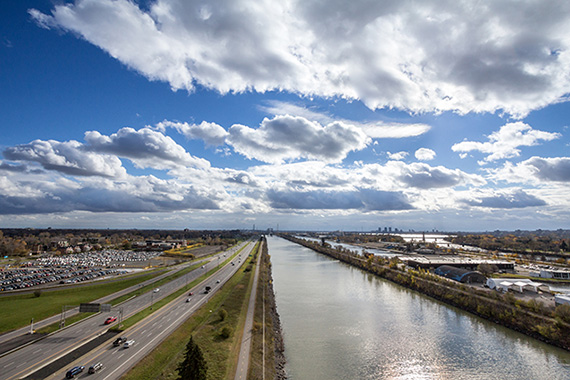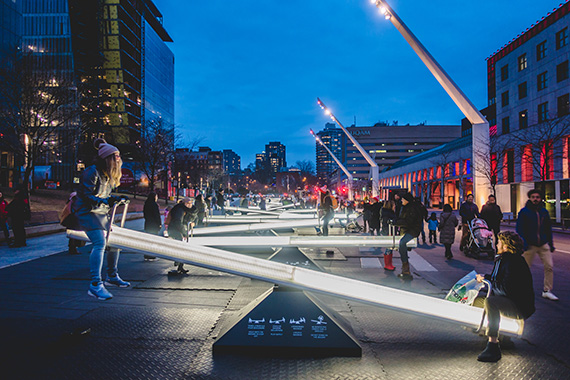
Grand Montréal: Attuned to the region’s distinctive characteristics
Discover the variety of areas of intervention of the Grand Montréal Business Office.
From: DEC - May 18, 2022
The Grand Montréal Business Office (BO) serves the economic heartland of Quebec. A territory with a diverse, highly innovative economy active in most of the province’s key sectors. To work in this vast ecosystem, advisors must have a fine understanding of regional economic issues.
|
The Grand Montréal BO serves the Montréal metropolitan region, including the Île de Montréal, Laval, and part of the Montérégie, Lanaudière and Laurentides regions. With 21 advisors, the seasoned team supports businesses and non-profit organizations in 18 regional county municipalities (RCMs), 142 municipalities, and three Indigenous communities of the Mohawk Nation: Kahnawake, Kanesatake and Akwesasne. |

To facilitate interactions, the Île de Montréal is divided into six sub-territories. Due to their distinctive regional characteristics, the 18 RCMs and Île de Montréal are shared among 15 advisors representing the entry point for businesses and organizations interested in receiving services from CED. Multi-talented and with solid networks, the advisors are highly proficient in a range of subjects and business strategies to provide personalized services to their clients.
“Whether we are working in a cutting-edge sector or one that is more traditional, the entrepreneurial issues are often similar. Our strength is to be able to understand the ecosystem the businesses operate in to ensure they are well-equipped in their efforts,” states BO Director Carol-Lyne Cloutier.
Île de Montréal: Innovation and exports

The Grand Montréal region is home to businesses from all horizons working to develop cutting edge technologies and raising Quebec’s profile on the international scene. On top of this comes a critical mass of businesses in anchor sectors such as agri-food, metal products, aerospace, life sciences and health technologies, and video games.
To help ensure projects are successful, advisors analyze and target the most relevant programs and establish ties with various partners. Knowledge of Montréal’s entrepreneurial fabric is of primordial importance because different players can come together to make a project a concrete reality and move it forward.
Joining forces in the storm
“During the two years of the pandemic, PME MTL never stopped investing in Montréal’s entrepreneurs. In 2020, the network was given responsibility for managing the relief funds granted by the three levels of government for the metropolis and worked with the Government of Canada for the first time through CED. This emergency funding has been vital for the 1350 businesses that received it, enabling them to weather the storm and seize new opportunities to take steps today towards a sustainable economic recovery.”

In some cases, emphasis is placed on connecting SMEs with research centres and educational institutions, which helps develop advanced technologies and ensure technologies are transferred to businesses. In collaboration with partners, advisors foster the growth of businesses active in promising industrial sectors such as new advanced materials, artificial intelligence, virtual reality, and clean technologies, including electric vehicles. In this burgeoning ecosystem, entrepreneurs will call on CED’s help to become more competitive in rising fields such as information and communications technologies, artificial intelligence, deep technologies, transportation electrification, and creative industries where the Greater Montréal region presents a competitive advantage on the international scene.
Quebec’s metropolis also relies on the presence of over 60 international organizations, including the prestigious World Anti-Doping Agency, International Civil Aviation Organization, and International Air Transportation Association, adding to Montréal’s international profile and cachet.
Entrepreneurial variety at its peak from the North Shore to the South Shore
On Montréal’s North Shore, the economy is quite diverse, and the BO works with manufacturing businesses that are major exporters in several industrial sectors. Take Mirabel, for example: Agricultural lands run alongside a world-class aeronautics hub. In both Laval and the MRC de Thérèse-De Blainville, the team works with businesses developing cutting-edge technologies, where the life sciences and medical technologies industries are very active.

With Longueuil as the fourth largest urban area in Quebec, the economy is just as diverse in the southern part of the metropolis. There is a high concentration of SMEs in the region. The local economy enjoys a strategic location and has top-notch transportation infrastructure, a highly qualified workforce, and major industrial research and development activities.
Added to this are many research centres in a variety of fields, including aeronautics and energy; and large government institutions such as the National Research Council Canada and the Canadian Space Agency.
Supporting Indigenous communities
There are also Indigenous communities located on and around the island. These communities play a key role in Quebec’s economic development, and CED is here to help them. “We aim to establish ties with Indigenous communities in order to learn more about their challenges and needs,” states Regional Economic Development Advisor Jean-François Renaud. “With the range of programs it offers, CED is able to support projects that foster community economic development and promote Indigenous tourism.”
Boosting economic development in such a broad range of communities and sectors requires in depth knowledge of the metropolitan region and its networks. An asset this dedicated team possesses in spades!
To know more, visit our Montréal webpage or contact us.